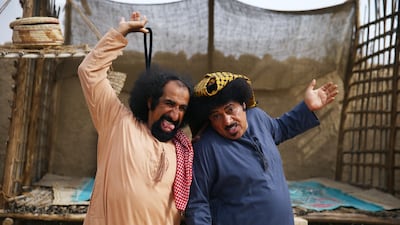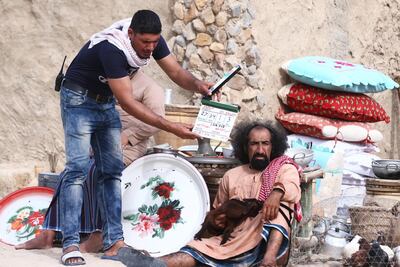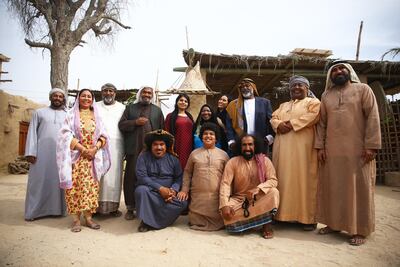Comedy is an effective gateway to tell history.
The anguish and challenges of the past are easier to swallow, while the modern advancements we readily take for granted can be shown through the use of absurd contrasts.
The Emirati comedy series Khashe' Nashe' has been highlighting both the past and present, quite literally.
Aired daily throughout Ramadan on Abu Dhabi’s Emarat TV, this charming sitcom takes us back to a small coastal freej (village) in 1969, two years before the formation of the UAE, as residents grapple with the arrival of electricity, education and a health care system.
Our guides in this historical trek are two brothers-in-law, who are the namesake of the series.
A Laurel and Hardy in kandouras, the dim-witted duo are tasked with hooking up the village with electricity.
As they venture into each home, mosque and small business of the freej, they either encounter problems or cause trouble and spend occasional bouts in the local jail.
Leading the cast are the much-loved Emirati duo Abdullah Zeid and Gomaa Ali, who play the roles of Kashe’ and Nashe’, respectively.
Zeid says the personalities of their characters are etched in their names.
“In the Emirati dialect, Kashe’ denotes a quality that is confrontational or abrasive. That is pretty much my character,” he says. “While my brother Gomaa plays Nashe’, that word means something that is soft and soothing.”
So how does that come into play in the series?
“It is simple,” Ali says. “Kashe’s creates trouble and I get the blame.”
Zeid says: “But that is life, no? In life, it is always the kind hearted and generous that become victims.”
Zeid comes into his own as a writer
It is that quick-fire interplay that is responsible not only for much of the hilarity of the series, but for making both Zeid and Ali an indomitable comedic duo of Emirati television and film.
This is the fifth time both actors have collaborated over the past decade, with their previous appearance being last year's film Felfel Abyad and the 2018 Ramadan comedy series Dar Al Zain.
While enjoying the familiarity, Ali says their latest partnership stands out due to the detailed script written by Zeid. After co-writing the 2018 series Hadek Madek, Zeid took the creative reigns completely for Khashe' Nashe' and penned all the episodes.
“It is here that you really see the birth of Abdullah Zeid, the writer,” Ali says.
“While the comedy is still there, what really makes the work stand out is the stories and insights that people will get about life before the UAE was formed. It shows where we Emiratis derive our values from and that was from us living and working together through some difficult times.”
Interestingly, these ideas came to Zeid while relaxing on a beach holiday in Thailand in 2018. It was there, he says, that he began outlining the story that has become Kashe' Nashe'.
This time around, Zeid says he wanted to dig deeper and deliver more than mere laughs. With the UAE celebrating its 50th anniversary next year, he wanted his story and characters to imbue the resilience and dynamism that powered the country’s growth.
“There is a lot of messages here,” he says. “I talk about how even before the UAE was formed, our leadership was forward-thinking and ensured that each freej got electricity, a good education and medical facilities. The show also looks at the importance of relationships, from the way we treat our elders to the rights of women, and how such values remains part of our lives today.”
The freej mentality remains strong in the UAE
To achieve that goal, Zeid knew he needed a cast and set to match his ambition. A real life coastal freej was assembled in two months last year on a patch of Ras Al Khaimah beach complete with dhows, plants, wildlife ranging from camels to horses and old pick-up trucks.
With the exception of 10 days of inclement weather, Zeid recalls the 60-day shoot went relatively smoothly. Best part of all, he says, was that each day was a learning experience.
Zeid’s affection for his co-star Ali, in addition to sharing screen time with veterans Ahmad Al Ansari (who plays the freej’s mayor) and Bahrain’s Salwa Bekheet, who is his onscreen mother, shows that the freej mentality in the UAE remains strong nearly 50 years on.
“Every day I spend with these amazing people I grow more,” he says. “The show may have two actors in the lead role, but each actor is the star of their own scenes. This is why the show works.”




